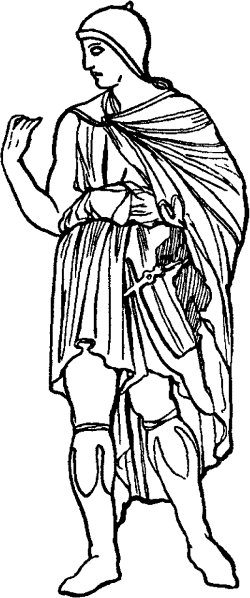Orpheus, The South Wind |
A Greek Legend |

In the land of Thrace there lived, years ago, one who was called Orpheus. He was the sweetest singer ever known. His voice was low and soft.
When men heard this voice all anger ceased, and their thoughts were thoughts of peace. Even wild animals were tamed.
Orpheus went into the woods one day and took nothing but his harp with him.
No quiver of arrows was on his back, nor hunting spear at his side.
He sang and sang till the birds flew down on the ground about him, and seemed to think that a creature with such a voice must be merely another kind of bird.
A wild cat came creeping slyly between the trees, trying to catch the little feathered listeners. Orpheus took his lute and played upon it, and the wild cat became as tame as the birds. They all followed Orpheus farther into the forest.
Soon, from behind a rock, a tiger sprang to attack the wild cat. The birds and the wild cat called to Orpheus. When he saw the trouble he took his harp again, and while he sang the tiger came trembling and purring to his feet and the birds, the wild cat, and the tiger followed Orpheus still farther into the forest.
He sat down by a tree to rest and the bees came and showed him where their honey was hidden in the tree. He fed his friends, and then he and the tiger led the way to a river where there was the purest water.
Tall trees bent low before him, and young trees tore themselves from the ground and followed in his train.
Foul waters parted so that Orpheus and his band might pass through unharmed; they knew no longer any evil thing.
Before they reached the river of pure water, to which the tiger was leading them, a lion, fierce with anger, sprang madly at his old enemy. Orpheus took his harp and played so wonderfully that the pine trees sighed with sorrow, and the lion, loosing his hold on the tiger, followed the sweet singer of Thrace. At the river the birds, the wild cat, the tiger, and the lion drank together with Orpheus, with not one thought of hurting one another.
"We are tired," said the birds. "Let us stay here by this river," and Orpheus agreed. The birds flew to the trees, while the others tried to rest on the huge rocks by the shore, but these were jagged and rough. They would give no rest to any one.
Then Orpheus began to play, and the hardest rocks were stirred. They rolled over and over into the river, and in their places the softest beds of white sand were ready for all. Orpheus rested, with the lion and the tiger for his night-watchers, and the wild cat asleep in the tree with the birds.
In the morning the harp sounded again, and the strange company wandered away, happy to be near the music. The three wild beasts fed together on the river grasses and forgot that they had been life-long enemies.
Orpheus had said, before he came into the wood, that he was tired of men and their quarrels; that wild beasts were easier to tame than angry men; and so he found it during these two days in the forest.
He took his harp and played and sang a sweet, wild song of love and peace, and overhead the leaves and branches of the oaks danced for joy of living. Not one growl, not one quarrel was heard where even the echoes of the music went. The very rocks answered the voice of Orpheus, and everything was at peace.
Then came the sound of the hunting dogs. The lion raised his shaggy head, but put it down again. Savage light came again into the eyes of the tiger and of the wild cat. The dogs came nearer. Orpheus played on his lute and the dogs came and lay down at his feet, and the hunters went home without their prey.
That night Orpheus led the birds and beasts all back to the places where he had found them, and went home to live once more in his cave in Thrace.
For years hunters told, over their camp-fires, strange stories of a tiger and a lion who lived together in the deep forest; of a wild cat with eyes like a pet fawn; and of birds whose songs were so sweet that wild beasts grew tame as they listened.
Sometimes, even in these days, it seems as if Orpheus were singing again.
When the wind stirs, there comes sweet music. The pine trees sigh, the leaves and branches of the forest trees dance as in the days when Orpheus first went into the woods of Thrace.
When the south wind blows, earth's voices become low and sweet, and the birds sing soft melodies to greet its coming.
Old books tell us that Orpheus was really the south wind itself.
Sources And Further Reading |
Project Gutenberg Classic Myths Retold by Mary Catherine Judd with drawings entirely from classic sources